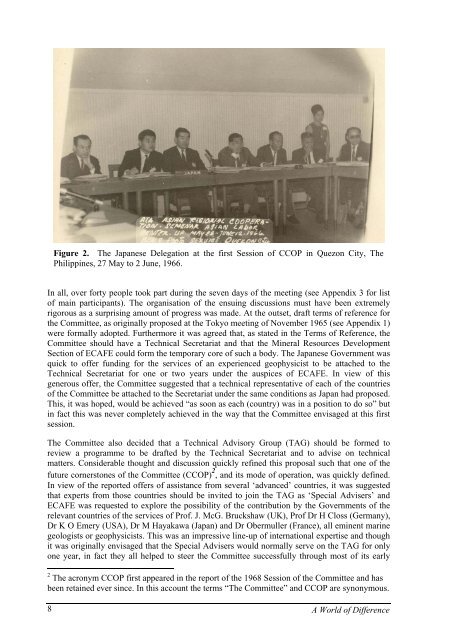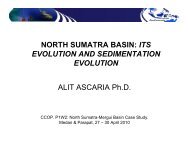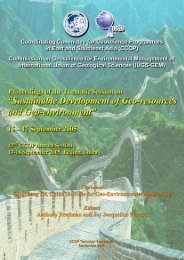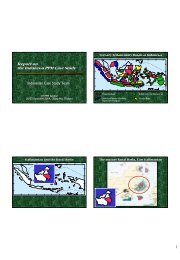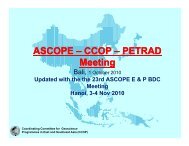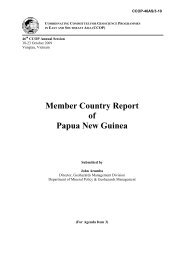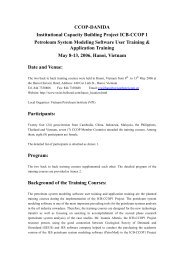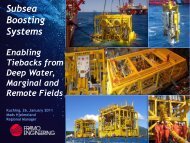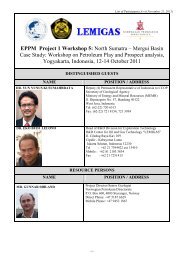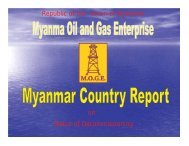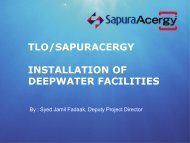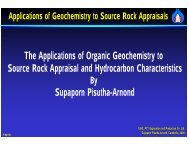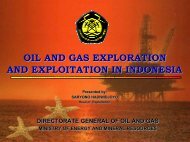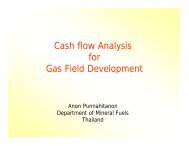Forty Years Of The Coordinating Committee For Geoscience - CCOP
Forty Years Of The Coordinating Committee For Geoscience - CCOP
Forty Years Of The Coordinating Committee For Geoscience - CCOP
Create successful ePaper yourself
Turn your PDF publications into a flip-book with our unique Google optimized e-Paper software.
Figure 2. <strong>The</strong> Japanese Delegation at the first Session of <strong>CCOP</strong> in Quezon City, <strong>The</strong><br />
Philippines, 27 May to 2 June, 1966.<br />
In all, over forty people took part during the seven days of the meeting (see Appendix 3 for list<br />
of main participants). <strong>The</strong> organisation of the ensuing discussions must have been extremely<br />
rigorous as a surprising amount of progress was made. At the outset, draft terms of reference for<br />
the <strong>Committee</strong>, as originally proposed at the Tokyo meeting of November 1965 (see Appendix 1)<br />
were formally adopted. Furthermore it was agreed that, as stated in the Terms of Reference, the<br />
<strong>Committee</strong> should have a Technical Secretariat and that the Mineral Resources Development<br />
Section of ECAFE could form the temporary core of such a body. <strong>The</strong> Japanese Government was<br />
quick to offer funding for the services of an experienced geophysicist to be attached to the<br />
Technical Secretariat for one or two years under the auspices of ECAFE. In view of this<br />
generous offer, the <strong>Committee</strong> suggested that a technical representative of each of the countries<br />
of the <strong>Committee</strong> be attached to the Secretariat under the same conditions as Japan had proposed.<br />
This, it was hoped, would be achieved “as soon as each (country) was in a position to do so” but<br />
in fact this was never completely achieved in the way that the <strong>Committee</strong> envisaged at this first<br />
session.<br />
<strong>The</strong> <strong>Committee</strong> also decided that a Technical Advisory Group (TAG) should be formed to<br />
review a programme to be drafted by the Technical Secretariat and to advise on technical<br />
matters. Considerable thought and discussion quickly refined this proposal such that one of the<br />
future cornerstones of the <strong>Committee</strong> (<strong>CCOP</strong>) 2 , and its mode of operation, was quickly defined.<br />
In view of the reported offers of assistance from several ‘advanced’ countries, it was suggested<br />
that experts from those countries should be invited to join the TAG as ‘Special Advisers’ and<br />
ECAFE was requested to explore the possibility of the contribution by the Governments of the<br />
relevant countries of the services of Prof. J. McG. Bruckshaw (UK), Prof Dr H Closs (Germany),<br />
Dr K O Emery (USA), Dr M Hayakawa (Japan) and Dr Obermuller (France), all eminent marine<br />
geologists or geophysicists. This was an impressive line-up of international expertise and though<br />
it was originally envisaged that the Special Advisers would normally serve on the TAG for only<br />
one year, in fact they all helped to steer the <strong>Committee</strong> successfully through most of its early<br />
2 <strong>The</strong> acronym <strong>CCOP</strong> first appeared in the report of the 1968 Session of the <strong>Committee</strong> and has<br />
been retained ever since. In this account the terms “<strong>The</strong> <strong>Committee</strong>” and <strong>CCOP</strong> are synonymous.<br />
8<br />
A World of Difference


